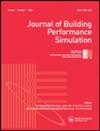居住者行为模型预模拟过程对住宅能源需求模拟的影响
IF 2.3
4区 工程技术
Q2 CONSTRUCTION & BUILDING TECHNOLOGY
引用次数: 5
摘要
居住者行为模型在建筑能源需求建模中起着重要的作用。在以前的研究中已经开发了有用的仿真算法;然而,为模拟乘员准备建模参数的预仿真过程受到的关注较少。本研究详细阐述了预仿真过程,并评估了它如何改变模型性能。我们以美国时间使用调查数据为例,选取了活动启动概率。采用多项式对数线性回归、支持向量机和人工神经网络三种参数制备方法,对不同数量和类型变量的三种情况下的模型性能进行了比较。所有考虑基本人口统计和时间相关变量的方法都能很好地再现平均概率。显著变量的增加有助于居住者间多样性的再现。所有的方法在给定的数据集中表现出相似的性能,尽管它们实际上是不同的。结果对预模拟过程的形成具有实际指导意义。本文章由计算机程序翻译,如有差异,请以英文原文为准。
Impact of the pre-simulation process of occupant behaviour modelling for residential energy demand simulations
Occupant behaviour models play an important role in building energy demand modelling. Useful simulation algorithms have been developed in previous studies; however, the pre-simulation process to prepare modelling parameters for simulated occupants has received less attention. This study elaborated on the pre-simulation process and evaluated how it may alter model performance. We selected the activity-starting probability using American time use survey data as an example. The model performance was compared under three cases representing different numbers and types of variables together with three parameter preparation methods: multinomial log-linear regression, support vector machine, and artificial neural network. All the methods considering basic demographic and time-related variables performed well in reproducing the average probabilities. An increase in significant variables contributed to the reproduction of inter-occupant diversity. All the methods showed similar performances within the given dataset, although they were practically different. The results offer practical guidance for shaping the pre-simulation process.
求助全文
通过发布文献求助,成功后即可免费获取论文全文。
去求助
来源期刊

Journal of Building Performance Simulation
CONSTRUCTION & BUILDING TECHNOLOGY-
CiteScore
5.50
自引率
12.00%
发文量
55
审稿时长
12 months
期刊介绍:
The Journal of Building Performance Simulation (JBPS) aims to make a substantial and lasting contribution to the international building community by supporting our authors and the high-quality, original research they submit. The journal also offers a forum for original review papers and researched case studies
We welcome building performance simulation contributions that explore the following topics related to buildings and communities:
-Theoretical aspects related to modelling and simulating the physical processes (thermal, air flow, moisture, lighting, acoustics).
-Theoretical aspects related to modelling and simulating conventional and innovative energy conversion, storage, distribution, and control systems.
-Theoretical aspects related to occupants, weather data, and other boundary conditions.
-Methods and algorithms for optimizing the performance of buildings and communities and the systems which service them, including interaction with the electrical grid.
-Uncertainty, sensitivity analysis, and calibration.
-Methods and algorithms for validating models and for verifying solution methods and tools.
-Development and validation of controls-oriented models that are appropriate for model predictive control and/or automated fault detection and diagnostics.
-Techniques for educating and training tool users.
-Software development techniques and interoperability issues with direct applicability to building performance simulation.
-Case studies involving the application of building performance simulation for any stage of the design, construction, commissioning, operation, or management of buildings and the systems which service them are welcomed if they include validation or aspects that make a novel contribution to the knowledge base.
 求助内容:
求助内容: 应助结果提醒方式:
应助结果提醒方式:


